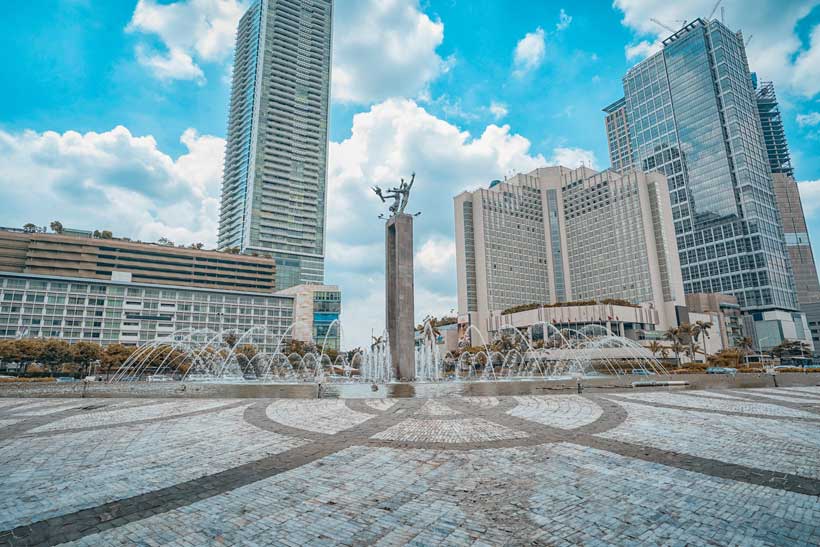Waste has been a critical problem in Indonesia. Reportedly, 40.16% of the 33.7 million tons of waste generated in 2024 was unmanaged. This statistic has forced the country to renew its 100% waste management target from 2025 to 2029. Besides, 48% of Indonesian households burn their waste despite the legal prohibition of such activity, causing air pollution and respiratory diseases. Amidst the shortcomings in Indonesia’s waste management system, the contribution of its informal waste pickers is inevitable.
The informal sector collects around 1 million tons of plastic waste, which mostly ends up at recycling facilities. In Jakarta alone, informal waste pickers have estimatedly reduced the waste volume by 30%, not only reducing the recycling costs for municipalities but also helping to extend the lifespan of dumps and sanitary landfills. As waste accounts for roughly 10% of Indonesia’s greenhouse gas emissions in 2021, the informal waste pickers’ work in diverting recyclables also contributes to combating climate change.
The Overlooked Workforce
Despite their central role in waste management, the well-being of informal waste pickers is far from ideal. Its precarious nature remains a major issue. Waste pickers in Bekasi and Depok earn only about one-third of the government’s minimum wage in both locations. In the Bantar Gebang landfill in Bekasi, the income per person not only fell below the legal minimum wage but was also lower than that of occupations in both the formal and informal sectors.
The informal waste pickers also work in horrible conditions. They often directly make contact with medical waste and other sharp waste. Leachate that contaminated the groundwater was also one of the most dangerous environmental problems at the site. Furthermore, many informal waste pickers do not have access to free health services, forcing them to rely on paid services or ignore their health problems.
To add insult to injury, the work of informal waste collection remains highly stigmatized due to its association with waste. Informal waste pickers in Surabaya cope with their low social status by changing clothes before they go home and emphasizing that waste-picking is at least a halal job, unlike stealing or other immoral occupations. Consequently, the combination of their precarious working conditions, low income, and social stigma often heightens their risk of psychological health issues, including depression.
Despite their roles in creating more livable cities, the regulation that includes informal waste pickers is nearly nonexistent. From the first law regulating waste management (Law No. 18/2008) to Presidential Regulation on National Waste Management Policy and Strategy (No. 83/2018) and Ministerial Regulation on Waste Reduction Roadmap by Producers (No. 75/2019), none of them explicitly recognize informal waste pickers. The regulations leave them outside of the system.
The poor condition of Indonesian informal waste pickers also stems from the intergenerational poverty cycle. These workers are trapped in debt and poverty due to the lack of access to employment, education, sanitation, water, healthcare, welfare schemes, and housing. Their low income as waste pickers and the lack of government protection prevent them from breaking the cycle.
The lack of institutional support, like cooperatives and unions, also hinders Indonesian informal waste pickers from leveraging their well-being. Albeit organizations like Pemulung Berdaya Cooperative and Indonesian Scavengers Association exist, they have not yet represented the majority of Indonesian informal waste pickers, especially in urban cities outside of Jakarta and its satellite areas.
Making the Invisible, Indispensable
Indonesia’s informal waste pickers might be invisible in policy, but they are surely indispensable in practice. Thus, the government needs to recognize these “invisible heroes” by acknowledging them as essential workers. Consider how Brazil’s national waste policy puts informal waste pickers as valuable actors in the waste management system. The law mandates the catadores (Brazilian informal waste pickers) to share responsibility in reducing the volume of solid waste.
Take the case of Belo Horizonte, a large city in Brazil, which developed an integrated system of solid waste management, including the catadores, into a formalized relationship with the wider recycling ecosystem. This might be one of the reasons why informal waste pickers in Belo Horizonte have a higher perceived social status compared to those in Surabaya, according to a study by Colombijn and Morbidini.
Integrating the informal waste pickers into the system may increase recycling rates while reducing child labor and providing benefits such as healthcare, education, and social recognition. The city of Accra, Ghana, formalized partnerships with informal waste pickers by providing them with access to finance, equipment, health insurance, and motorcycle licenses.
Just as crucial is creating and supporting cooperatives to give economic agency to informal waste pickers. Learning from the Solid Waste Collection and Handling (SWaCH) Cooperative in India, the presence of institutional support not only provides gloves, masks, footwear, jackets, carts, and implements for its members. Beyond this, cooperatives act as intermediaries and leverage the bargaining power of informal waste pickers. In Pune, every registered waste picker has the right to health insurance, thanks to the advocacy work of the cooperative.
The same inclusive principle must also extend to Indonesia’s Extended Producer Responsibility (EPR) system. Despite the formal regulation through the Ministerial Regulation (No. 75/2019), informal waste pickers are once again overlooked. Excluding informal waste pickers from the EPR system is neither practical nor just, according to the Consumer Goods Forum’s Coalition of Action on Plastic Waste. Instead, EPR financing may target waste pickers’ cooperatives or other inclusive initiatives. The Producer Responsibility Organization can provide technical support to improve informal waste pickers’ rights and working conditions. Most importantly, the informal waste pickers themselves must be included in the discussion of EPR policy formulation.
The stakes are clear: promoting a better waste management system is not merely about the technology and infrastructure, but also justice and inclusion. Considering the environmental and economic benefits they have contributed to society at large, informal waste pickers should not remain the “invisible heroes.” They have kept our cities clean; they too have the right to a better living standard and recognition.
